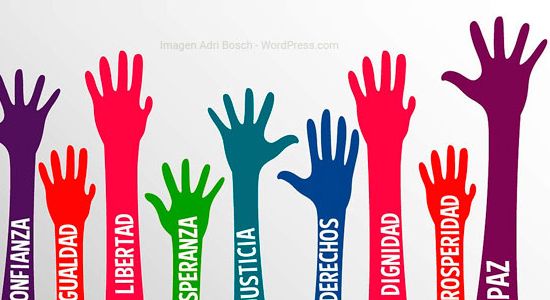 |
| Imagen tomada de: https://compartirpalabramaestra.org |
This volume seeks to examine cultural production in Colombia in relation to human rights discourse and practice. A fundamental contradiction inevitably structures the universal human rights discourse: on the one hand, there cannot be any “human” rights without a vindication or recognition of the universal, the transnational, and transcendental principles; on the other, the materiality of human rights—with regards to both their violation and their defense—is always local, political, and historically grounded (Stern & Strauss). Paradoxically, at the national level, the state is oftentimes at once both the guarantor of human rights law and the perpetrator of violations. At the international level, the human rights discourse has been deployed frequently in opposition to regional movements for independence and decolonization. A core conflict that runs through these tensions and others involves the ever-changing division between bare life and political life (Agamben), the hierarchical classification of humanity, or, as Judith Butler has written, the question of what constitutes a “grievable life.” How do cultural products engage through the symbolic and the imaginary the structures that categorize humanity? Some potential lines of inquiry for articles in this volume include the following, among others:
• What are the cultural aspects that link human rights narratives in Colombia with different representations of memory and postmemory, as they support new forms of citizenship construction? How are larger political and cultural forces such as the ongoing armed conflict, gender violence and other forms of violence, migration, displacement, truth and reconciliation reports and commissions, states of exception, and economic policies interrogated through different forms of human rights narratives? How are these narratives linked to human rights advocacy and activism in Colombia? Transmitting the past into the present through the study of memory in human rights narratives serve not only to explore violations against its citizens, but also provides examples of how the construction of citizenship is cemented through solidarity and the collective struggle for justice.
• How do literary and other cultural products articulate truth claims with the aim of denouncing, exposing, or remembering human rights violations, and how are these claims subsequently (de)legitimized by social, political, legal, and cultural structures? What are the ethical implications of aestheticizing violence and human rights violations? What happens when cultural production grounded in the telling of a local experience of a human rights crisis enters national, international, and global flows?
• The predominant Euro-American historiography of the human rights regime tends to trace “a direct line of descent from the American Declaration of Independence and the 1789 French Déclaration des droits de l’homme et du citoyen to the 1948 Universal Declaration of Human Rights (UDHR) and the completion of the International Bill of Human Rights, with the late entry into force in 1976 of the International Covenant on Economic, Social and Cultural Rights (ICESCR) and the International Covenant on Civil and Political Rights (ICCPR),” as indicated by Joseph Slaughter. The bogotano Antonio Nariño’s translation and circulation of the “Declaration of the Rights of Man” fits neatly into this narrative. How can this historiography be interrogated through different local and regional narratives? What are alternative perspectives, sources, and (micro)histories—from Colombia and the Global South—of the creation and evolution of the human rights discourse?
• How do the metaphorical three generations of human rights—civil and political rights; economic, social, and cultural rights; and solidarity rights—manifest themselves in Colombian contexts and how are these prioritized in different ways? How does Colombian cultural production reflect, enact, or embody the collective rights of different groups (indigenous, Afro-descendants, LGBTQ, and other communities), and what is the role of such production in the interstices among rights, laws, and social justice in the wake of the Colombian Constitution of 1991 and subsequent national and international laws, decrees, and covenants aimed at protecting specific populations.
• While human rights arguably have become the hegemonic language of human dignity, the majority of the world population is not subject of human rights but rather objects of human rights discourses (de Sousa Santos). What are alternative grammars and articulations of human dignity in the Colombian context, and to what degree are they compatible or incompatible with the language of human rights? Within the current paradigm of neoliberalized individual human rights, what are the possibilities for pluriversal imaginations and relational and communal modes of knowing, being, and doing (Escobar); what are other (re)configurations of human subjectivity in relation to the body, the animal, personhood, and the political (Esposito); and how are theories of capabilities (Sen and Nussbaum) applied in different local, regional, and national settings? How does the human rights discourse interface with notions of environmental and ecological justice, especially, in the face of global climate change, regional (neo)extractivism, the implementation of megaprojects, and post-conflict (re)appropriations of land? What are different ways of articulating the human rights subject in relation to land, the natural world, and the non-human?
This volume focuses on Colombian cultural production in relation to the human rights discourse and practice. Multidisciplinary and comparative approaches are welcome, and a wide range of cultural production may be examined including literary texts, film, theater, performance, plastic arts, music, and other modalities and repertoires of aesthetic and symbolic expression. To propose an original, unpublished article for this volume, please send the following items in a Word document to the co-editors: name, e-mail, institutional affiliation, article title, and a 600-750-word summary.
Timeline:
- Deadline for submission of proposals – August 15, 2019
- Notice to proposal submitters of selection for the prospectus – September 30, 2019
- Final articles due – May 15, 2020
Co-editors:
Kevin Guerrieri, kevin2@sandiego.edu, University of San Diego
Carlos Gardeazábal Bravo, cagbravo@loyola.edu (or carlos.gardeazabal_bravo@uconn.edu), Loyola University Maryland


No hay comentarios